Using alternative cell types, such as yeast, could reduce mAb production time from 5-6 months to 2-3 months. MIT studied the readiness of a yeast currently used to produce commercial therapeutic monoclonal antibody for rapid responses to pandemic situations.
Steps of the project included:
•Demonstrated single-round clonal selection for master cell banks in 7 days using bicistronic expression vectors to co-express both heavy and light chains. Data suggests cell line creation and banking of antibody-expressing yeast could be achieved in under 30 days with existing protocols and approaches from the time of DNA receipt.
• Demonstrated that perfusion‐based fermentation can sustain viable cell densities 50‐100% higher than conventional fed‐batch fermentation.
•Perfusion operations could minimally achieve wet cell weights > 600 g/L. Typical reports for fed-batch densities with K. phaffii typically range from 300‐450 g/L.
Proof-of-concept data from this study for sustained continuous production of recombinant protein using yeast provides support for next‐generation manufacturing strategies for fast, efficient production of recombinant proteins that may enable improved equitable access and affordability of medicines in the United States and globally, including mAbs and other recombinant protein products such as insulin.
Established reference cells and materials to guide additional development for fast efficient production of Mabs in a yeast organism that could enhance capabilities for pandemic responses.
Informed an alternative manufacturing solutions for on-going responses to protect from COVID-19 or other emerging pathogens.
Directly advanced the biotechnologies that enable small‐footprint biomanufacturing of proteins.
Login to the NIIMBL member portal to access more, including:
Not yet a member? Learn more about which level of NIIMBL membership is right for you and your organization.

Massachusetts Institute of Technology